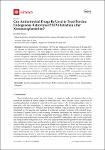Can Antiretroviral Drugs Be Used to Treat Porcine Endogenous Retrovirus (PERV) Infection after Xenotransplantation?
Denner, Joachim
Porcine endogenous retroviruses (PERVs) are integrated in the genome of all pigs; they are released as infectious particles, and under certain conditions they can infect human cells. Therefore, they represent a risk when pigs are used as sources of cells, tissues, or organs for xenotransplantation. Xenotransplantation is under development due to the increasing shortage of human transplants. Whereas most porcine microorganisms which may be able to induce a disease (zoonosis) in the transplant recipient can be eliminated, this is not possible in the case of PERVs. Antiretroviral drugs which had been developed for the treatment of human immunodeficiency virus-1 (HIV-1) infections have been tested in vitro for their efficacy in inhibiting PERV replication. Inhibitors of the viral reverse transcriptase and of the integrase have been found effective. The most effective inhibitor of the reverse transcriptase was azidothymidine (AZT); the integrase inhibitors were the most potent inhibitors of PERV. Although in the past PERV transmission has not been observed after experimental or clinical xenotransplantation of pig cells or organs, and although PERVs may one day be inactivated in pigs by genome editing using CRISPR/Cas, knowing which antiretroviral drugs can effectively restrict PERV infection will still be important.
No license information

